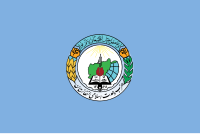Hezb-e-Wahdat
|
Islamic Unity Party of Afghanistan
حزب وحدت اسلامی افغانستان Hizb-e Wahdat Islami Afghanistan |
|
|---|---|
 |
|
| Leader | Karim Khalili |
| Founder | Abdul Ali Mazari |
| Founded | 1989 |
| Headquarters | Kabul, Afghanistan |
| Ideology |
Shi'a Islamism Hazara minority rights |
| Colors | Black, red, and green |
| Party flag | |
 |
|
| Website | |
| https://web.archive.org/web/20010503130353/http://www.wahdat.net/ | |
Hizb-e Wahdat-e Islami Afghanistan (Persian: حزب وحدت اسلامی افغانستان; "the Islamic Unity Party of Afghanistan"), shortened to Hizb-e Wahdat (حزب وحدت), was founded in 1989. Like most contemporary major political parties in Afghanistan, Hizb-e Wahdat is rooted in the turbulent period of the anti-Soviet resistance movements in Afghanistan in the 1980s. It was formed to bring together nine separate and mostly inimical military and ideological groups into a single entity. During the period of the Afghan civil war in the early 1990s, it emerged as one of the major actors in Kabul and some other parts of the country. Political Islamism was the ideology of most of its key leaders but the party gradually tilted towards its Hazara ethnic support base and became the key vehicle of the community’s political demands and aspirations. Its ideological background and ethnic support base has continuously shaped its character and political agenda. Through the anti-Soviet jihad and the civil war, Hizb-e Wahdat accumulated significant political capital among Afghanistan’s Hazaras.
By 2009, however, Hizb-e Wahdat was so fragmented and divided that the political weight it carried in the country bore little resemblance to what it had once been. It had fragmented into at least four competing organizations, each claiming ownership of the name and legacy of Hizb-e Wahdat.
Following the collapse of the pro-Soviet Kabul government in the Hazarajat in 1979, the region fell under the control of Shuray-e Ittefaq, a hastily assembled region-wide organization Soon it was challenged and overthrown by several new radical Islamist groups that engaged in endless power and ideological struggles that engulfed the region for most of the 1980s. The wars and conflicts were launched and fought with strong ideological fervor. However, none of the organizations were able to determine the outcome of the war in their favor. Towards the second half of the 1980s a complete stalemate was emerging in the region, with each organization confined to specific pockets of territory. The devastation and atrocities perpetrated during the war were eroding the credibility of their ideologies and leaderships. As a result, there was an overwhelming desire for change felt both by the villagers and senior leaders of the organizations.
...
Wikipedia
